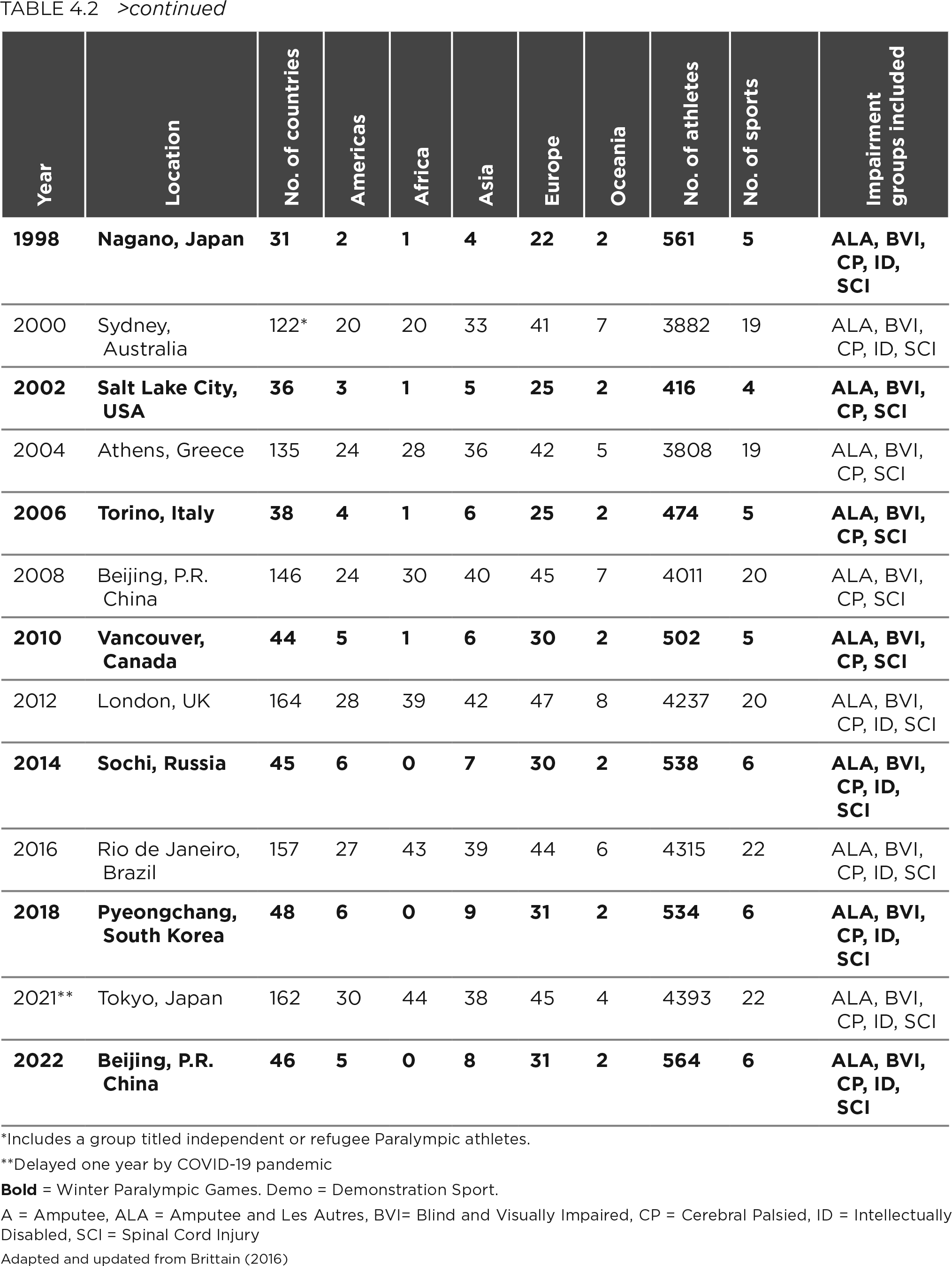The Start of the Paralympic Games
This is an excerpt from Introduction to Adaptive Sport and Recreation by Robin Hardin,Joshua R Pate.
By Ian Brittain
Guttmann’s consistent linking of the Stoke Mandeville Games with the Olympic Games moved to another level following the annual meeting of the World Veterans Federation in Rome in May 1959. A meeting with various people from the National Institute for Insurance Against Accidents at Work (INAIL) and Dr. Maglio of the Spinal Unit, Ostia, Rome, was held. The decision was made for the 1960 Stoke Mandeville Games to be held in Rome a few weeks after the Olympic Games were to take place in the same city (The 1960 International Stoke Mandeville Games for the Paralysed in Rome, 1960).
Following a reasonably successful event in Rome where 21 nations participated, the idea of hosting a 1964 Games in Tokyo, which had already been selected to host the Olympic Games, was raised. An invitation to the Japanese hosts led to Japan sending its first team to the Stoke Mandeville Games in 1962 and, ultimately, its acceptance to host the Games in Tokyo in 1964. Twenty-one nations again attended. The 1968 Olympic Games were due to be held in Mexico City and, despite initial interest from Instituto Nacional de Rehabilitación to host the Games of 1968, the director of the rehabilitation center in Mexico City ultimately concluded that financial constraints and accessibility issues with facilities in Mexico City meant they would be unable to host the Games. Following offers from both New York and Tel Aviv, it was decided that the 1968 Games would be held in Israel (Brittain, 2014).
It was hoped that the Games would be held by the Olympic host city in 1972, which was to be Munich. However, the Munich Olympic Organizing Committee declined to host on the basis that the Olympic village was to be converted into housing immediately after the Games, and it was, apparently, too late to change this. The Germans did, however, offer the alternative of Heidelberg University, which was accepted. In 1976, with the Olympic Games due to be held in Montreal, Canada, the Organizing Committee once again declined to host the Games, which were now to be a much larger combined International Stoke Mandeville Games Federation (ISMGF) and International Sports Organization for the Disabled (ISOD) Games consisting of paraplegics, blind, and amputee athletes, which added to both the size and the complexity of the Games. The Games were eventually held in Toronto, Canada, instead. The 1980 Paralympic Games were awarded to Arnhem in the Netherlands following a lack of response from the Olympic organizers in Moscow (Brittain, 2014).
No evidence can be found that any attempt was made by ISMGF or ISOD to secure the use of the Los Angeles Olympic venues in 1984 for their own Games, although the Games were awarded to the United States to host. However, following political moves by the National Wheelchair Athletics Association, the decision was taken to split them into ISMGF Games, to be organized by NWAA at the University of Illinois, and ISOD Games, to be organized by ISOD in Nassau County, New York, at around the same time. However, political and fundraising problems around the wheelchair Games forced the University of Illinois to withdraw their support for the Games in early 1984, and the wheelchair Games were transferred at short notice to Stoke Mandeville (Brittain, 2014).
From 1988 onward, the Summer Paralympic Games have been held in the same host city as the Olympic Games beginning about two weeks after the Olympic closing ceremony. The only exception to this was the Paralympic Games for Intellectually Disabled Athletes that was held in Madrid in 1992 as a precursor to intellectually disabled athletes being added to the program with the other four impairment groups in Atlanta four years later (Brittain, 2016). See table 4.2 for details of how the Games have developed between 1960 and 2022.


SHOP

Get the latest insights with regular newsletters, plus periodic product information and special insider offers.
JOIN NOW
Latest Posts
- Using double inclinometers to assess cervical flexion
- Trunk flexion manual muscle testing
- Using a goniometer to assess shoulder horizontal adduction
- Assessing shoulder flexion with manual muscle testing
- Sample mental health lesson plan of a skills-based approach
- Sample assessment worksheet for the skill of accessing valid and reliable resources


